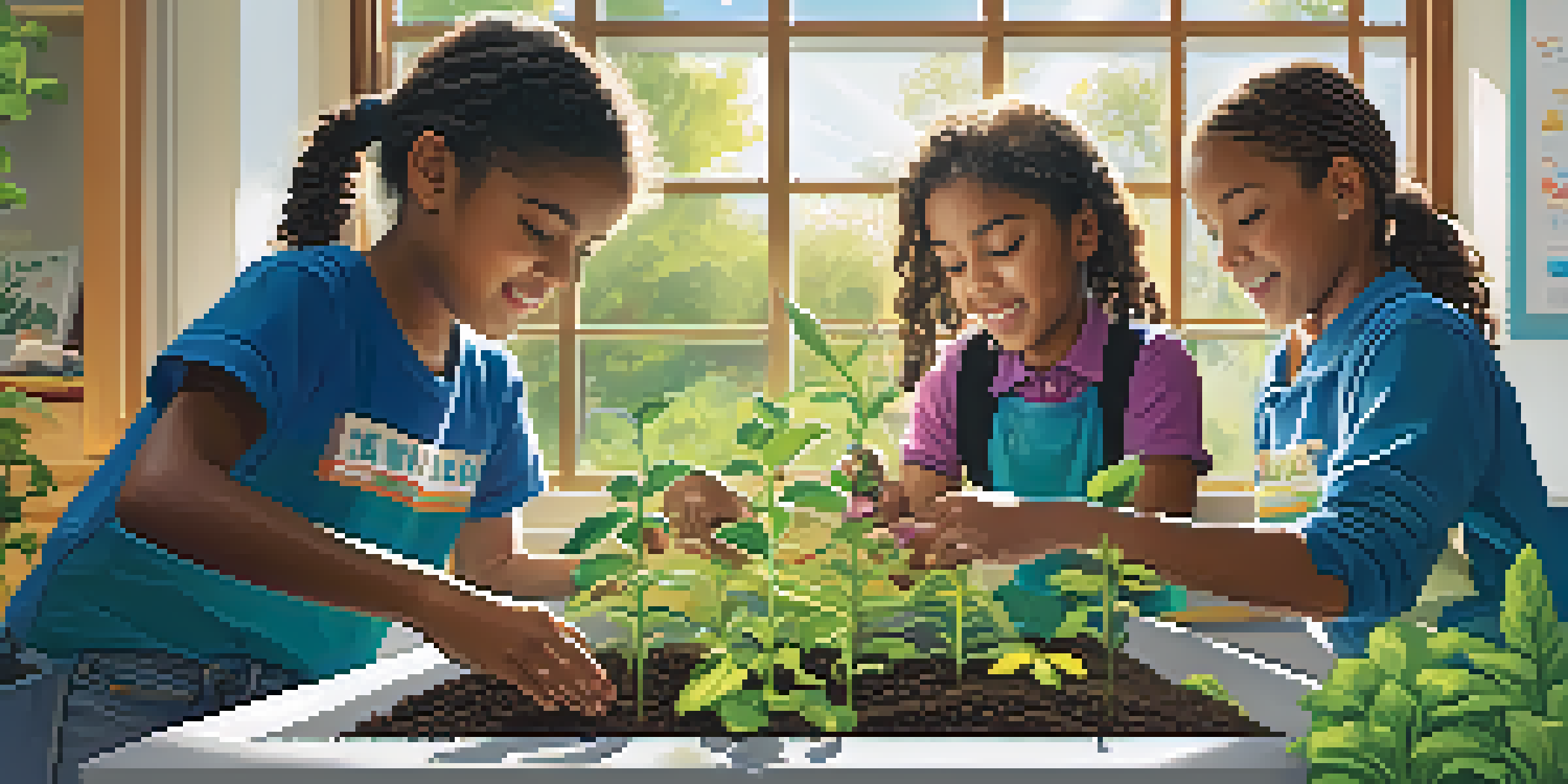The Importance of Water Conservation Education in Schools

Why Water Conservation Matters for Future Generations
Water is one of our most precious resources, and its scarcity is becoming a pressing issue globally. Teaching students about water conservation helps them understand the importance of protecting this vital resource. Just like learning to recycle or reduce waste, water conservation is a habit that can significantly impact our environment.
We won't have a society if we destroy the environment.
When students grasp the concept of water scarcity, they become more responsible stewards of the planet. They learn that every drop counts, whether it's in their homes, schools, or communities. This foundational knowledge fosters a sense of responsibility that can shape their behaviors for years to come.
Moreover, instilling these values early in life can lead to a generation that prioritizes sustainability. Just think about it: if kids grow up understanding the importance of saving water, they are more likely to carry these lessons into adulthood, influencing their own families and communities.
Integrating Water Education into the Curriculum
Incorporating water conservation into school curricula doesn't have to be complicated. Teachers can integrate lessons on water cycles, ecosystems, and even the science of hydration. By making these lessons interactive and engaging, students are more likely to connect with the content.

Project-based learning is another effective approach. For instance, students can participate in local clean-up days or water audits at their schools, allowing them to see firsthand the impact of water usage. This hands-on experience reinforces classroom learning and fosters a deeper appreciation for water conservation.
Importance of Water Education
Teaching students about water conservation fosters responsibility and sustainability for future generations.
Additionally, schools can collaborate with local organizations and experts to create educational programs. Guest speakers, field trips, and community projects can enhance students' understanding of water issues in their local areas, making the lessons more relevant and impactful.
The Role of Technology in Water Conservation Education
Technology plays a pivotal role in modern education, and it's no different when it comes to teaching about water conservation. Interactive apps and online resources can make learning about water usage and conservation engaging for students. Gamification, such as water-saving challenges, can motivate students to apply what they've learned in fun ways.
The greatest threat to our planet is the belief that someone else will save it.
Moreover, simulations and virtual reality experiences can immerse students in water-related scenarios. For example, they can explore the consequences of droughts or floods in a controlled environment, understanding the urgency of conservation efforts. This experiential learning can leave a lasting impression.
By using technology, educators can also track students' water-saving efforts at home or school. This data can be used to highlight progress and inspire friendly competition among classmates, encouraging a community-wide commitment to water conservation.
Creating a Culture of Conservation in Schools
To make water conservation a priority, schools can create a culture that values sustainability. This could involve starting a 'Water Warriors' club, where students lead initiatives to reduce water waste. Such clubs not only empower students but also encourage teamwork and leadership skills.
Additionally, schools can implement water-saving practices, such as installing low-flow faucets and toilets. These changes can serve as practical examples for students, illustrating the impact of conservation efforts in their daily lives. When students see their school taking action, they are more likely to follow suit.
Engaging Curriculum Strategies
Integrating interactive lessons and hands-on projects enhances students' understanding of water conservation.
Celebrating achievements in water conservation can further motivate students. Whether it’s through awards, assemblies, or recognition in school newsletters, acknowledging efforts reinforces the idea that every contribution matters in the fight for water sustainability.
Engaging Parents and the Community in Conservation Efforts
Water conservation education shouldn't be limited to the classroom; engaging parents and the community is crucial. Schools can host workshops or informational nights focused on water-saving techniques at home. This not only informs parents but also strengthens the connection between school learning and family practices.
Parents can also get involved by participating in school projects, such as rain garden installations or water conservation challenges. When families work together on these initiatives, it reinforces the importance of conservation and creates a ripple effect in the community.
Moreover, partnerships with local businesses and organizations can enhance educational efforts. Collaborating on community events or campaigns focused on water conservation can amplify the message, making it clear that everyone has a role to play in protecting our water resources.
Measuring the Impact of Water Conservation Education
To understand the effectiveness of water conservation education, it's essential to measure its impact. Schools can conduct surveys or assessments to gauge students' knowledge before and after implementing water education programs. This data can provide valuable insights into areas that may need more focus.
Behavioral changes can also be an indicator of success. Tracking water usage in schools before and after education initiatives can highlight tangible results. If students are more mindful of their water consumption, it shows that the lessons are resonating.
Community Involvement is Key
Engaging parents and local organizations strengthens conservation efforts and creates a culture of sustainability.
Additionally, sharing success stories can inspire other schools to adopt similar programs. By showcasing the positive changes resulting from water conservation education, schools can motivate others to prioritize this critical topic, creating a broader movement for sustainability.
The Future of Water Conservation Education in Schools
As the world faces increasing water challenges, the need for effective water conservation education in schools becomes more critical. Educators must continuously adapt their approaches to stay relevant and engage students. This might involve incorporating new technologies, teaching methods, or even current events related to water issues.
Looking ahead, collaboration will be key. Schools, communities, and organizations must work together to create comprehensive educational programs that address local and global water issues. By pooling resources and knowledge, we can create a more significant impact on students and their understanding of conservation.

Ultimately, investing in water conservation education today lays the groundwork for a sustainable future. When students are equipped with the knowledge and skills to conserve water, they become empowered advocates for change. Their actions can lead to a healthier planet and a more sustainable way of living for generations to come.